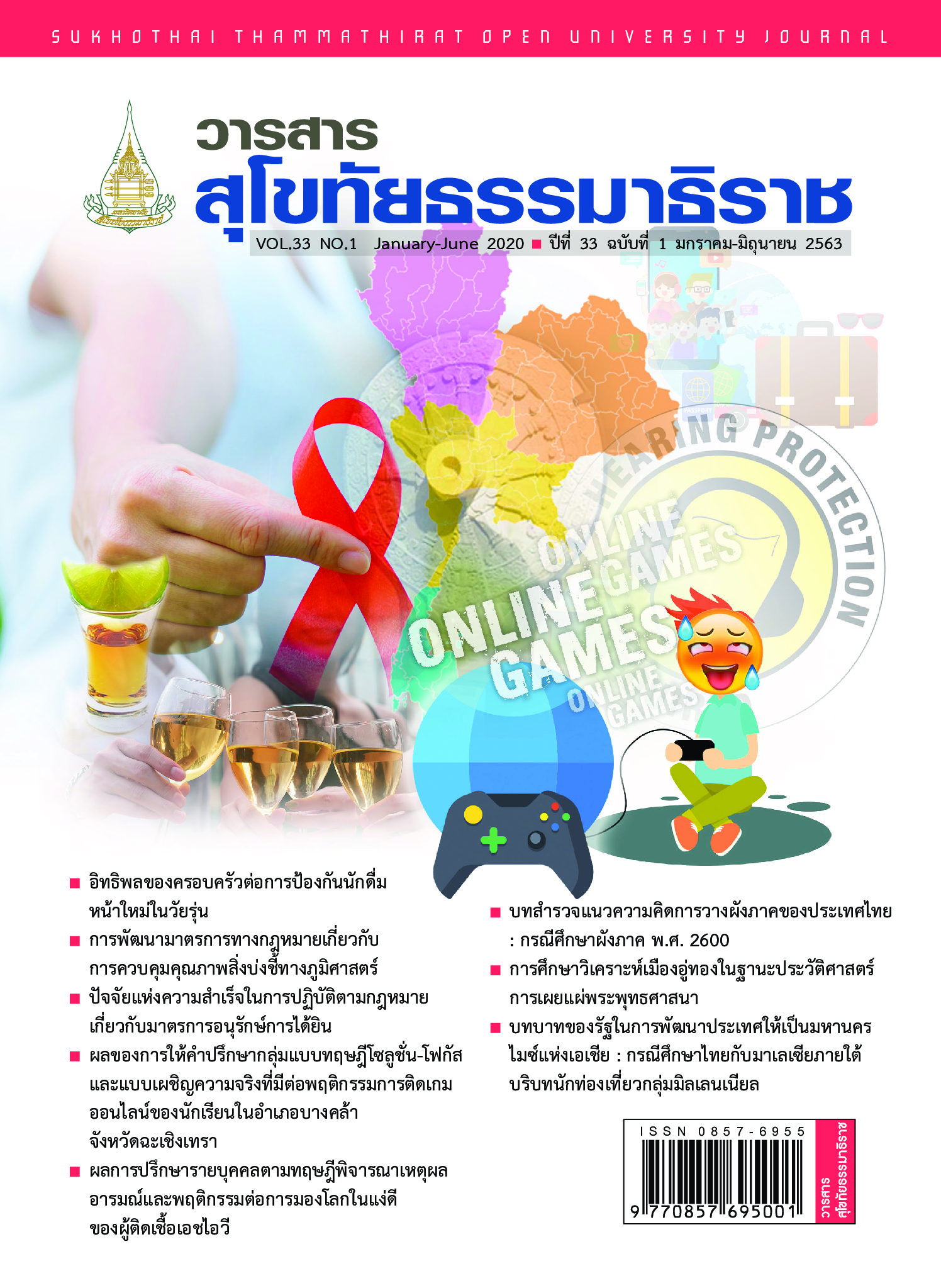ผลของการให้คำปรึกษากลุ่มแบบทฤษฎีโซลูชั่น-โฟกัสร่วมกับการให้คำปรึกษากลุ่มแบบเผชิญความจริงที่มีต่อพฤติกรรมการติดเกมออนไลน์ของนักเรียนในอำเภอบางคล้า จังหวัดฉะเชิงเทรา
คำสำคัญ:
การให้คำปรึกษากลุ่มแบบทฤษฎีโซลูชั่น-โฟกัส /การให้คำปรึกษากลุ่มแบบเผชิญความจริง /พฤติกรรมการติดเกมออนไลน์บทคัดย่อ
งานวิจัยนี้มีวัตถุประสงค์เพื่อสำรวจพฤติกรรมติดเกมออนไลน์ของนักเรียนในอำเภอบางคล้า จังหวัดฉะเชิงเทรา สร้างโมเดลการให้คำปรึกษาการให้คำปรึกษากลุ่มแบบทฤษฎีโซลูชั่น-โฟกัสร่วมกับการให้คำปรึกษากลุ่มแบบเผชิญความจริงที่มีต่อพฤติกรรมการติดเกมออนไลน์ และศึกษาผลของการให้คำปรึกษากลุ่มแบบทฤษฎีโซลูชั่น-โฟกัสร่วมกับการให้คำปรึกษากลุ่มแบบเผชิญความจริงที่มีต่อพฤติกรรมการติดเกมออนไลน์ ประชากรที่ใช้ในการวิจัยครั้งนี้คือนักเรียนในอำเภอบางคล้า จังหวัดฉะเชิงเทรา ที่ลงทะเบียนในภาคเรียนที่ 1-2 ประจำปีการศึกษา 2558 จำนวน 4,613 คน โดยใช้ กลุ่มตัวอย่างที่เก็บข้อมูล โดยใช้แบบทดสอบการติดเกม ฉบับเด็กและวัยรุ่น (Game Addiction Screening Test :GAST) โดยใช้การเลือกกลุ่มตัวอย่างแบบเจาะจง (Purposive sampling) และกำหนดขนาดของกลุ่มตัวอย่างใช้ตารางสำเร็จรูปของ ทาโร ยามาเน่ (Yamane) จำนวน 385 คนเพื่อเก็บข้อมูลด้วยแบบทดสอบการติดเกม ฉบับเด็กและวัยรุ่น และ กลุ่มทดลองในการทดลองจำนวน 1 กลุ่ม จำนวน 9 คน ศึกษาผลของการให้คำปรึกษากลุ่มแบบทฤษฎีโซลูชั่น-โฟกัสร่วมกับการให้คำปรึกษากลุ่มแบบเผชิญความจริงที่มีต่อใช้ในการศึกษาพฤติกรรมการติดเกมออนไลน์ เป็นนักเรียนระดับชั้นมัธยมศึกษาปีที่ 2 ของโรงเรียนบางคล้าพิทยาคม วิเคราะห์สถิติพื้นฐาน ได้แก่ ค่าต่ำสุด ค่าสูงสุด ค่าเฉลี่ย และส่วนเบี่ยงเบนมาตรฐานของคะแนนวิเคราะห์เปรียบเทียบการติดเกมออนไลน์ของนักเรียน One-way ANOVA
ผลการวิจัยพบว่า
- พฤติกรรมติดเกมออนไลน์ของนักเรียนในอำเภอบางคล้า จังหวัดฉะเชิงเทราจากแบบทดสอบการติดเกม ฉบับเด็กและวัยรุ่น รวม 385 คน เพศชาย จำนวน 211 คน โดยกลุ่มตัวอย่าง มีโดยรวมมีคะแนนรวมของแบบทดสอบ GAST คะแนนต่ำกว่า 24 จัดอยู่ในกลุ่มปกติ ระดับความรุนแรงของปัญหา พบว่า ยังไม่มีปัญหา ในการเล่นเกม ส่วนเป็นเพศหญิง จำนวน 174 คน โดยรวมมีคะแนนรวมของแบบทดสอบ GAST คะแนนต่ำกว่า 16 จัดอยู่ในกลุ่มปกติ ระดับความรุนแรงของปัญหาการติดเกมออนไลน์ พบว่า ยังไม่มีปัญหาติดเกมออนไลน์ เพศหญิงเริ่มมีปัญหาในการติดเกมออนไลน์โดยมีคะแนน 19.43
- ระดับการติดเกมออนไลน์ของนักเรียน ก่อนทดลอง หลังทดลอง และระยะติดตามผล พบว่า ก่อนทดลองและหลังทดลองแตกต่างกันอย่างมีนัยสำคัญทางสถิติที่ระดับ .05 โดยหลังทดลองมีระดับการติดเกมลดลง และเมื่อเปรียบเทียบหลังทดลองและระยะติดตามผล พบว่า ไม่แตกต่างกัน
เอกสารอ้างอิง
Anantakoon, T., Krisanan, W., Chaisakda, S., & Thuwasetthakun, C. (2547). Thai Children and Teenagers on the Internet, the Creative and Dangerous Perspective. Factors Related to Behavior and Playing Computer Games of Secondary School Students in Bangkok. Bangkok : National Electronics and Computer Technology Center.(in Thai)
Anderson, H., & Goolishiam, H. (1992).The Client is the Expert : A Not-knowing Approcach Therapy.In S. McNamee & K.J. Gergen (Eds.) Therapy as Social Construction (pp.25-39).Newbury Park, CA:Sage.
Bertolino. (2010). Collaborative, Competency-based Counseling and Therapy. Boston: Allyn & Bacon.
Bubenzer, D.L., & West, J.D. (1993). William Hudson O’Hanlon: On Seeking Possibilities and Solutions in Therapy. The Family Journal: Counseling and Therapy for Couples and Families, 1(4), 365-379.
Charleswort, J.R., & Jackson, M. (2004). Solution-focused Brief Counseling : An Approach for Professional School Counselors. In B.T. Erford (Ed.), Professional School Counseling:A Handbook of Theories, Program & Practice. p.p. 139–148. Austin, TX: CAPS Press.
Charoenrat, T., Chalerm, W., Tansiri, A., Sirathatnararot, T., Kulnaphadon, T., Pongmode V., & Athipanchapong, T. (2556). The research project to develop a spatial management network to analyze the situation and drive the development of quality of life for children and youth in the eastern region. Bangkok: Thailand Research Fund.(in Thai)
Corey, M.S., Corey, G. & Corey, C. (2004). Groups Process and Practice. (3rd ed.) CA: Brooks/Cole. Cengage Learning.
Corey, M.S., Corey, G. & Corey, C. (2012). Groups Process and Practice. (9th ed.) CA: Brooks/Cole. Cengage Learning.
Daosumang, N. (2549). The Factors Related to Computer Game Playing Behavior of Secondary School Students in Bangkok. A Thesis for the Degree of Master of Program in Home Economics Education. Kasetsart University.(in Thai)
De Jong, P., & Berg, I.K. (2002). Interviewing for Solutions. (2nd ed.) Pacific Grove, CA: Brooks/cole.
De Shazer, S. (1988). Clues: Investigating Solutions in Brief Therapy. New York : W.W. Norton & Company.
Hoff, L.A. (1995). People in Crisis: Understanding and Helping (4th ed.). San Francisco: Jossey-Bass.
Horchareon, A. (2557). The Relationship between Self-control and Online Gaming Behavior of Junior High School Students. Independent Research: Master of Education of Educational Psychology and Guidance Program. Chiang Mai University. http://laptemilk.exteen.com/(online), 2013 (Retrieved January 2015).(in Thai)
Jacobs, E., Masson, L., & Harvill, L. (2002). Group Counseling Strategies and Skills. (4th ed.) CA: Brook/Cole.
Kale, D., & Little, S. (2005). Edge Generation in Developing Countries: A Theoretical for Exploring Dynamic Learning in High-technology Firms in The Electronic Journal of Knowledge Management 3(2):87-96. [Online]. Available from: http://www.ejkm.com. [10 July 2014].
Karen, R., & Andrew, S. (2002). The Resilience Factors: Seven Key to Finding Your Inner Strength and Overcoming Life’s Hurdles. Three Rivers Press, An Imprint of the Crown Publishing Group, A division of Random House, Inc., New York.
Kelman, H.C. (1963). The Role of the Group in the Education of Therapeutic Change. International Journal of Group Psychotherapy. Vol.13.
Laptemilk. Knowledge About the Game. http://laptemilk.exteen.com/(online), 2013 (Retrieved January 2015)
Mahajarearn, J. (2547). The Study Behavior and Impact of Online Game Media Exposure of High School Students in Mueang District Nakhon Pathom Province. Bangkok : A Thesis for the Degree of Master. Faculty of Journalism and Mass Communication. Thammasat University.(in Thai)
Metcalf, L. (1998). Solution-focused Group Therapy : Ideas for Groups in Private Practice,Schools, Agencies, and Treatment Program. New York: Free Press.
Murphy, J.J. (2008). Solution-focused Counseling in Schools. Alexandria, VA: American Counseling Association
Nakornthap, A. (2545). Educational Management by Family: Home School. Bangkok: Office of the National Education Commission.(in Thai)
O’Hanlon, W.H., & Weiner-Devis, M. (2003). In Search of Solutions: A New Direction in Psychotherapy. New York: Norton.
Piamyoosuk, T. (2549). Behavior Patterns for Playing Online Games of Children and Adolescents. Bangkok: A Thesis for the Degree of Master. Faculty of Journalism and Mass Communication. Thammasat University.(in Thai)
Sennan, T. (2549). The Behavior and Effects of Addiction to Online Games of Group Game Players at the Student. Chulalongkorn University.(in Thai)
Siriyurasak, U. (2547). Children Television Advertisements: The Collection of Academic Articles about the Impact that Children Receive from the Media and Guidelines for Management. Bangkok: Children for Development Foundation.(in Thai)
Sklare, G.B. (2005). Brief Counseling that Works: A Solution-focused Approach for School counselors and Administrators. Thousand Oaks, California: Corwin Press & The American School Counselor Association.
Tophan, P. (2550). The Important Factors that Influence the Motivation of Teenagers in Playing Online Games. Bangkok: Ramkhamhaeng University.(in Thai)
Walter, J.L., & Peller, J.E. (1992). Becoming Solution-focused in Therapy. New York : Brunner/Mazel, INC.
Wisetsin, T. (2551). The Online Game Exposure Behavior and Opinions of Secondary School Students in Bangkok Towards Violence in Online Games. Bangkok: A Thesis for the Degree of Master. Faculty of Journalism and Mass Communication. Thammasat University.(in Thai)
Wubbolding, R.E. (2000). Reality Therapy for the 21st century. Muncie, IN: Accelerated Development (Taylor & Francis group).
ดาวน์โหลด
เผยแพร่แล้ว
รูปแบบการอ้างอิง
ฉบับ
ประเภทบทความ
สัญญาอนุญาต
บทความที่ได้รับการตีพิมพ์เป็นลิขสิทธิ์ของวารสารมหาวิทยาลัยสุโขทัยธรรมาธิราช
ข้อความที่ปรากฏในบทความแต่ละเรื่องในวารสารวิชาการเล่มนี้เป็นความคิดเห็นส่วนตัวของผู้เขียนแต่ละท่านไม่เกี่ยวข้องกับมหาวิทยาลัยสุโขทัยธรรมาธิราช และคณาจารย์ท่านอื่นๆในมหาวิทยาลัยฯ แต่อย่างใด ความรับผิดชอบองค์ประกอบทั้งหมดของบทความแต่ละเรื่องเป็นของผู้เขียนแต่ละท่าน หากมีความผิดพลาดใดๆ ผู้เขียนแต่ละท่านจะรับผิดชอบบทความของตนเองแต่ผู้เดียว
ห้ามนำข้อความทั้งหมด หรือบางส่วนไปพิมพ์ซ้ำ เว้นแต่จะได้รับอนุญาตจากกองบรรณาธิการวารสาร



